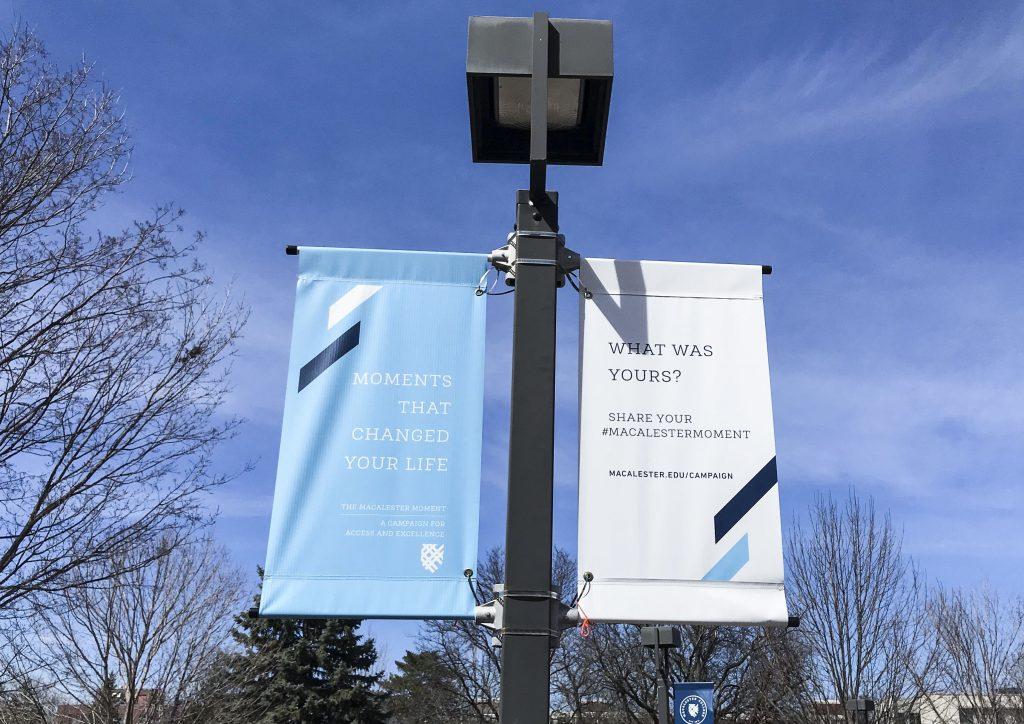Mac Moment reaches $100 million goal
April 18, 2019
Macalester’s “Mac Moment” fundraising campaign launched privately in 2016 with the goal of raising $100 million for the college over four years. The school aimed to put $40 million towards financial aid and $20 million each towards the Macalester Fund, programming and academic support respectively.
The effort went public in Oct. 2018 with a celebratory gala in the Leonard Center. Over the past year, Macalester hosted several “Big Questions” events in cities across the globe, featuring prominent administrators, faculty and alumni in conjunction with the campaign.
The projected end of the campaign wasn’t until May 2020. However, six months after the campaign’s public launch and over a year shy of its projected end, Mac Moment has already succeeded in raising the target $100 million.
“Happily, [we reached our goal] faster than we expected,” President Brian Rosenberg said. “You plan these campaigns on the basis … of what consultants tell you you’re likely to be able to raise and that’s why we aimed for $100 million in four years. When you exceed that and you reach that goal much more quickly than you thought you might, it’s gratifying.”
Vice President of Advancement Andrew Brown noted that the campaign’s unique, concentrated format helped it elicit strong support from the Macalester community.
“It’s atypical to go shorter and more targeted, but we felt that was right, and we felt that would get a good response, and it has,” he said.
Despite this victory, the Mac Moment campaign will continue in pursuit of additional fundraising goals.
According to the Macalester website, the college’s fundraising priority for the rest of the year is to raise an additional $2 million dollars for the Macalester Fund — an all-purpose pool of donations that provides broad annual support for many aspects of Macalester’s operations. In addition, the school is still seeking $10 million in outright gifts and pledges by May 2020.
“The single biggest priority is financial aid,” Rosenberg said. “That is sort of a bottomless bucket for us, we always need more help with financial aid. Then, student-faculty research, career development, entrepreneurship and the Macalester Fund.”
At the time of the campaign’s launch, the college’s ultimate goal was to keep its budget on par with its peer institutions. That budget disparity is partially due to a lull in fundraising efforts following a $250 million donation from Dewitt Wallace in 1987. While that donation briefly made Macalester one of the wealthiest colleges in the United States, it has had to play catch-up since.
Though the $100 million achievement puts the college ahead of its expectations, fundraising can do little to fundamentally change a college’s financial situation. Only around five percent of the college’s budget comes from fundraising each year.
“Absent someone who gives you a completely transformative gift of the kind that Macalester got from DeWitt Wallace way back… fundraising doesn’t change the overall financial health of an institution,” Rosenberg said.
Macalester has also struggled to keep up with wealthier peer institutions who have continuously engaged with large-scale fundraising efforts.
“There is kind of an unfortunate truth out there which is that colleges that have more money than us are also out there fundraising,” Brown said. “It’s very hard to close a gap between us and some of our aspirational peers financially.”
Brown noted that Macalester’s commitment to economic accessibility and meeting all of students’ demonstrated financial need has also set Macalester back financially.
“We’re very proud of our economic diversity, and having students from various backgrounds,” he continued. “A lot of our very wealthy peers are less economically diverse than us, and have historically been even less economically diverse than they are now. But what that’s done is that has contributed to their wealth.”
According to The New York Times, Macalester ranked 62 out of 65 academically elite U.S. colleges in terms of median parental income in 2013.
Though the immediate financial effects of fundraising campaigns like the Mac Moment are limited, Brown and Rosenberg believe its success indicates a strong network of alumni and community support. The Mac Moment campaign has solicited gifts from donors that have the potential to positively impact the college in the years to come.
“There are types of gifts called planned gifts,” Brown said. “These are gifts that people make through their estate, like through a will for instance. In past campaigns and past fundraising, we’ve raised some of those dollars, but it hasn’t been a focus area for us… so this campaign focused on it, and we’ve had a lot of success in the area of planned gifts.
“That isn’t cash that will come in today, but that is cash that we will get in the future, and what we’re doing is building this pipeline of planned gifts that over the course of the next 10 years or so will turn into a very nice cash pipeline for the college,” he continued.
Rosenberg attributes the campaign’s resounding success to the generosity of donors as well as the dedication of advancement staff and support from the board of trustees.
“We’ve had a lot of people who have stepped up and been very generous,” Rosenberg said. “Some who we knew were Macalester supporters, but others [too], particularly some alumni who we didn’t realize were prepared to support Macalester at the level that they did.”
One of the strongest indicators of the Mac Moment campaign’s success is support from young alumni, according to Rosenberg.
“They’re clearly not in a position to make large gifts at this point in our lives, but they have been so great about participating and about volunteering and about attending events, and I think that that bodes really well for the future of the college,” Rosenberg said.















Donna Martin • Sep 11, 2019 at 1:30 am
I have observed that over the course of constructing a relationship with real estate homeowners, you’ll be able to get them to understand that, in every real estate exchange, a percentage is paid. In the end, FSBO sellers really don’t “save” the payment. Rather, they fight to earn the commission by simply doing a strong agent’s work. In doing so, they invest their money as well as time to carry out, as best they could, the assignments of an real estate agent. Those duties include uncovering the home by marketing, offering the home to willing buyers, constructing a sense of buyer emergency in order to make prompt an offer, preparing home inspections, controlling qualification checks with the financial institution, supervising repairs, and facilitating the closing of the deal.
Warren Ogden • Sep 8, 2019 at 12:44 am
Thanks a lot for sharing this with all of us you actually know what you’re talking about! Bookmarked. Kindly also visit my website =). We could have a link exchange arrangement between us!
Delphine Rives • Jul 22, 2019 at 3:40 pm
Mass parsite http://bit.ly/2W9CVkn